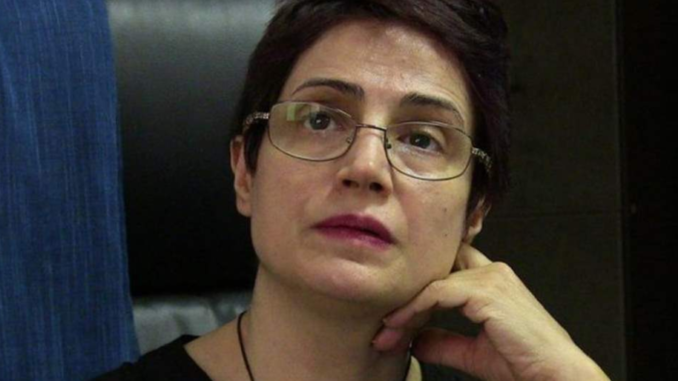
On June 13, the human rights lawyer Nasrin Sotoudeh was arrested in her home in Tehran and transferred to the prosecutor’s office of Evin prison, according to her husband, Reza Khandan.
Sotoudeh was told she was arrested to serve a five-year prison sentence, said Khandan, but neither he nor his wife knew anything about this sentence.
The same day, Amnesty International issued a statement calling for Iranian authorities to immediately release Nasrin Sotoudeh. The statement said, “We call on the Iranian authorities to release Nasrin Sotoudeh immediately and unconditionally.
Any action short of this must be unreservedly condemned by the international community.”
The statement also claims, “In recent weeks, Nasrin Sotoudeh has spoken out against the application of a Note to Article 48 of Iran’s 2015 Code of Criminal Procedure. The Note to Article 48 denies individuals facing some offenses, including those related to national security, the right to access an independent lawyer of their own choosing during the investigation of their charges. Instead, individuals can only select from a roster of pre-approved lawyers chosen by the Head of the Judiciary.
The Head of the Judiciary issued a list with only 20 people pre-approved for Tehran province.”
Philip Luther, Director of Amnesty International’s Middle East and North Africa Program, stated, “Permitting only lawyers who are pre-approved to defend individuals accused of ‘security’ offences – who often include human rights defenders – completely undermines the right of detainees to a lawyer of their own choosing.”
Nasrin Sotoudeh recently represented Narges Hosseini, who was prosecuted for peacefully protesting against compulsory veiling in Iran earlier this year. Since the December / January protests this year, dozens of women have been violently attacked and arrested for peacefully protesting against compulsory veiling.
Previously, in September of 2010, Sotoudeh was sentenced to six years in prison on charges of “spreading propaganda against the system” and “gathering and colluding to commit crimes against national security” for her work — defending prisoners of conscience and juvenile offenders sentenced to death. She was awarded the Sakharov Prize for her human rights work in 2012 while in prison. She received a pardon, and was released in September of 2013.
Despite attempts by the Iranian authorities to limit her work, she persisted in her work, even while having many of her requests to represent individuals detained for political reasons rejected.

